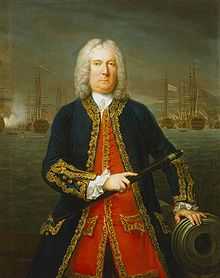Claude Arnulphy



Claude Arnulphy (1697 - 22 June 1786), also spelt Arnulphi, was a French painter, chiefly of portraits, based at Aix-en-Provence in the south of France.
Early life
Arnulphy is claimed to have been born either at Grenoble or at Lyons, but Aix is also a possibility.[1] He was the son of Charles Arnulphy, a painter at Paris, although originally from the County of Nice in the Italian Duchy of Savoy, by his father's marriage to Madeleine Prongey, and he spent his childhood years in the French capital city. He first trained as a painter in his father's studio, then went to Rome to study under Benedetto Luti (1666–1724), becoming principally a portrait artist.[2]
Career
Arnulphy established himself in the city of Aix in about 1722, where he enjoyed a long artistic career and where many of his works survive.[3] He was the master of Jean-François Pierre Peyron,[4] and Antoine Gibelin (1739–1813), another native of Aix, also began to study art under Arnulphy.
His work has been compared with that of Hyacinthe Rigaud (1659–1743) and Nicolas de Largillière (1656–1746).[5]
His portrait of Thomas Mathews (pictured) is one of four surviving portraits he painted of officers of a Royal Navy fleet lying off Toulon between 1742 and 1744. Three of these are now in the National Maritime Museum at Greenwich.[6]
In February 1732, Arnulphy married Marguerite Aubaye, and they had ten children, of whom seven were sons. However, only one child, according to different sources a son named Joseph or François Arnulphy (died 1825) survived childhood.[2][7]
In 1765, as the result of the Will of Honoré Armand de Villars, a new drawing school was established which became known as the École de dessin d'Aix-en-Provence, with the painter Charles Marcel Aune as its first principal and Arnulphy as his deputy. In 1785, Aune resigned the headship of the school to travel to North America, and Arnulphy took over from him. However, being by then aged no less than eighty-eight, he chose a successor in the shape of a much younger man, Jean-Antoine Constantin.[2]
Arnulphy also held a variety of public offices in Aix, including those of syndic and treasurer.[2] He died on 22 June 1786 and was buried the next day in the Récollets cemetery at Aix.[7] Constantin duly succeeded him at the école de dessin.[2]
Notes
- ↑ Louis Dimier, Les peintres Francais du dix-septieme siecle (Éditions G. van Oest, 1928), p. 301: "peut-être à Grenoble, peut-être à Lyon".
- ↑ 2.0 2.1 2.2 2.3 2.4 André Alauzen, La Peinture en Provence (Marseilles: éd. Jeanne Laffitte, 1987), pp. 101-102
- ↑ Pierre Cabanne, Guide artistique de la France (1968), p. 487: "Claude Arnulphy, Lyonnais ou Grenoblois d'origine, arriva à Aix vers 1722; il fit de nombreux portraits et mourut en 1786, octogénaire."
- ↑ Philippe de Chennevières, Recherches sur la vie et les ouvrages de quelques peintres, vol. 1, p. 44
- ↑ Marion Harry Spielmann, The Magazine of Art, vol. 1 (1903), p. 369
- ↑ Basil Greenhill, The National Maritime Museum (1982), p. 74
- ↑ 7.0 7.1 Dimier, p. 305
| Wikimedia Commons has media related to Claude Arnulphy. |